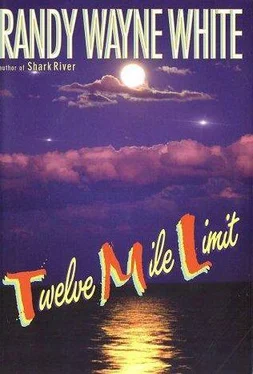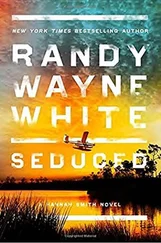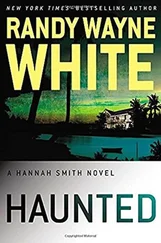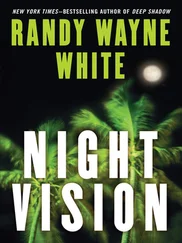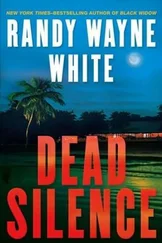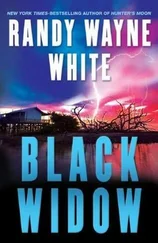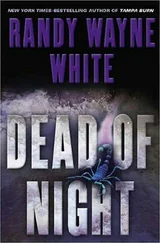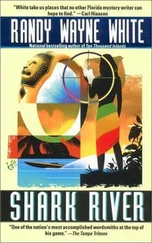Randy White - Twelve Mile Limit
Здесь есть возможность читать онлайн «Randy White - Twelve Mile Limit» весь текст электронной книги совершенно бесплатно (целиком полную версию без сокращений). В некоторых случаях можно слушать аудио, скачать через торрент в формате fb2 и присутствует краткое содержание. Жанр: Триллер, на английском языке. Описание произведения, (предисловие) а так же отзывы посетителей доступны на портале библиотеки ЛибКат.
- Название:Twelve Mile Limit
- Автор:
- Жанр:
- Год:неизвестен
- ISBN:нет данных
- Рейтинг книги:4 / 5. Голосов: 1
-
Избранное:Добавить в избранное
- Отзывы:
-
Ваша оценка:
- 80
- 1
- 2
- 3
- 4
- 5
Twelve Mile Limit: краткое содержание, описание и аннотация
Предлагаем к чтению аннотацию, описание, краткое содержание или предисловие (зависит от того, что написал сам автор книги «Twelve Mile Limit»). Если вы не нашли необходимую информацию о книге — напишите в комментариях, мы постараемся отыскать её.
Twelve Mile Limit — читать онлайн бесплатно полную книгу (весь текст) целиком
Ниже представлен текст книги, разбитый по страницам. Система сохранения места последней прочитанной страницы, позволяет с удобством читать онлайн бесплатно книгу «Twelve Mile Limit», без необходимости каждый раз заново искать на чём Вы остановились. Поставьте закладку, и сможете в любой момент перейти на страницу, на которой закончили чтение.
Интервал:
Закладка:
Keesha glared at him but said nothing.
I asked permission of the three hunters before walking to the animals to get a closer look.
Supposedly, of the five freshwater species of dolphins in the world, the pink Amazon River dolphin, Inia geoffrensis, is the most intelligent. I say “supposedly” because the bottle-nosed dolphin has been so consistently imbued with compassionate, human qualities-even by biologists who should know better-that, these days, I doubt much of what I read about them.
But research on these rare, freshwater dolphins predated an unfortunate transition, for some, from science to wistful mysticism. Even early researchers described them as sensitive, intuitive mammals with a measurable brain capacity 40 percent larger than that of humans. At that time, they were considered to be one of the least threatened species of dolphins, though even then their numbers were small.
If desperate men were now hunting them for food, I doubted if the future of the species was still as certain.
I remembered reading that, because Amazon River dolphins had no known natural predators, they didn’t need to live in large groups, or pods, for protection. As a result, they were solitary swimmers, though occasionally seen in small family groups of five or six.
These village hunters had managed to kill three females, a young male, and a very large, mature male that looked to be just over nine feet long and had to weigh at least two hundred pounds. There was no mistaking the sex. Death had freed the muscles that held their genitalia within their abdomens.
I touched my finger to the harpoon hole in back of the large male, then moved around the animal, noting the physiological differences between this freshwater animal and the dolphin I saw so often back on Sanibel Island.
He had a very long beak that was lined with tiny hairs, and small, almost piggish eyes-in water so murky, sight would not be so important. He had disproportionately large flippers, and a hump on his back instead of a fin. The pink color, I suspected, had something to do with the iron oxide color of the river.
To the hunters, I said, “Did you take them near here?”
“Yes! Very close. Only a few kilometers away.”
“I’ve heard they are very intelligent. I’m surprised they let you get close enough to harpoon them.”
One of the men stepped forward, very proud of himself. “Sir, you are correct in saying that they are the smartest of fish. But they are not so smart as man. I discovered a way!
“We found one of the botos in a narrow river, and used a net so that she could not escape. Are you familiar with the strange noise these animals make when they are hurt? We kept her wrapped in the net while she made these sounds. Soon, other botos appeared. Perhaps to rescue this female. It was easy, then, to use our harpoons.” Laughing, he added, “Though it was not so easy to stay in our boats as they pulled us all over the river!”
Everyone in the circle of huts thought that was hilarious.
I opened the belly of one of the females, using my hands to part the stomach panels as if opening a thin curtain. She had net burns on her delicate skin-this was the female who’d called for help.
They’d emptied everything out of her, but for one small oversight. There was a partially developed pup in her womb. I left the dead infant where it was, then knelt, and searched through the viscera. “Was there anything in their bellies?”
“One small catfish, nothing else. They were very hungry.” The young hunter laughed and added, “Like our families. But not now. Tonight, we will have a feast!”
Keesha told me, “Do you believe me now? This is an evil place.”
We were walking through the village, up a mud road. Among the huts, naked children played in banana thickets while scrawny dogs lay in pools of sunlight, cleaning themselves. We’d been told that a man who lived on the outskirts of the village was very rich and might have a cell phone we could use, so we were searching for him.
To Keesha, I said, “I don’t know about evil, but it certainly isn’t very attractive.”
“No!” she said. “Evil! The botos, the pink ladies-they are sacred animals. How can you have lived and not know about them? At night, they grow hair and walk away from the Tefe River. They have magical powers-they’re witches. They will punish this village. They’ll destroy it. We must leave very soon!”
She was very agitated. Killing human beings didn’t seem to bother her nearly so much. I told her, “I don’t see much worth destroying. But, yeah, I’m with you. The sooner we get away from here, the better.”
The wealthiest man in the village was a middle-aged Irishman with blood-bleary eyes who wore Birkenstock sandals, hiking shorts, a native shirt made of colorful patches, and a black beret over his long gray hair, which he wore tied in a ponytail.
Unlike the other shacks in the village, his house was made of unpainted concrete block and shingle, with a muddy yard protected by an out-of-place white picket fence. Parked out front, half in the road, was a new Toyota 4-Lux, a shortbed pickup truck papered with bumper stickers: Vegetarians Are Delicious!
To Become Master, Pose as a Servant.
Free Erin!
Life Is a Sexually Transmitted Disease.
He didn’t open the door immediately when I knocked. There was a blanket covering the house’s main window. The blanket moved, and I saw a nose press against the glass. A few moments later, the door cracked opened an inch or two.
The Irish accent was unmistakable, even though he spoke in Spanish: “Who are you? Why are you here?”
Paranoia isn’t paranoia if someone is really after you. This guy’s voice had the sound of genuine fear.
I replied in English, “I need to use a phone. It’s very important. I’ll pay you, no problem.”
The door cracked slightly wider, and I could see a wedge of his red Irish skin, and one dark eye. “Tell me who you are, what you’re doing here. There’re no gringos in this village. They don’t belong.”
I almost asked, Then what are you doing here?
Instead, I took refuge in an old, familiar lie. I explained to him that I was a marine biologist, here to do research on the rare Amazonian dolphin but that my boat had been stolen. Because I had friends in the village of Remanso, waiting on me, I had to contact them immediately.
I added, “If you drive me there, I’ll pay you whatever you want. A couple hundred dollars? Three hundred? In American money. It’s that important. Or let me use your phone. Please.”
He looked at me, then looked at the heavy, plastic briefcase. “What’a you got in there?”
“Cameras, research equipment. A waterproof case is the only way to protect the stuff.”
He thought for a moment, then nodded. “Wait here. I’ll be out in a few minutes.”
When he closed the door, I heard him lock it behind him.
I looked at Keesha. “You said there was an evil man in this village. Is that him?”
“No. He’s a drunk. Could you not smell him? The evil man lives on top of the mountain. Up there.”
I followed her gaze to the west. High above us, several miles away, atop the rain-scarred hillside, was what looked to be a clustering of big houses.
“He lives there,” she said. “I have heard stories that people go into that house and never return. He’s the one my people call the Bad Gift. He’s an American-like you.”
The Irishman came out carrying a beat-up Nokia cell telephone. “It’s all charged up, but you can’t get a signal here,” he said. “I’ll have to drive you to the top of the hill. Until we got all that goddamn jungle cut down, you couldn’t even get a signal up there.” He paused. “It’s gonna cost you a hundred bucks, Yank. In advance.”
Читать дальшеИнтервал:
Закладка:
Похожие книги на «Twelve Mile Limit»
Представляем Вашему вниманию похожие книги на «Twelve Mile Limit» списком для выбора. Мы отобрали схожую по названию и смыслу литературу в надежде предоставить читателям больше вариантов отыскать новые, интересные, ещё непрочитанные произведения.
Обсуждение, отзывы о книге «Twelve Mile Limit» и просто собственные мнения читателей. Оставьте ваши комментарии, напишите, что Вы думаете о произведении, его смысле или главных героях. Укажите что конкретно понравилось, а что нет, и почему Вы так считаете.
